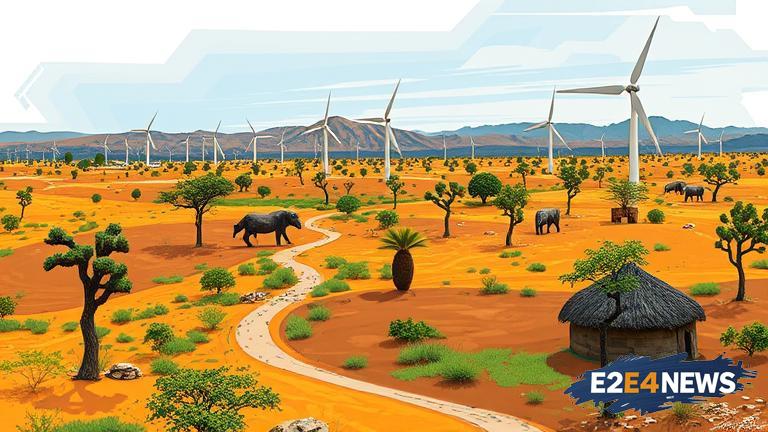The African continent is witnessing a significant shift towards renewable energy, driven by the need to address the pressing issues of energy access, climate change, and sustainable development. With many countries still struggling to provide reliable and affordable electricity to their citizens, renewable energy has emerged as a viable solution. Solar and wind power are leading the charge, with countries like South Africa, Egypt, and Morocco investing heavily in these sectors. The African Union’s ambitious goal of achieving 100% access to electricity by 2030 has further accelerated the adoption of renewable energy. Governments and private sector companies are working together to develop large-scale renewable energy projects, creating new opportunities for investment and job creation. The use of renewable energy is also expected to reduce greenhouse gas emissions, contributing to a cleaner and healthier environment. Moreover, renewable energy can help to reduce dependence on imported fossil fuels, improving energy security and reducing the burden on foreign exchange reserves. The cost of renewable energy is decreasing rapidly, making it more competitive with fossil fuels and increasing its attractiveness to investors. However, challenges persist, including the need for significant investment in grid infrastructure and energy storage systems. Despite these challenges, the future of renewable energy in Africa looks promising, with the potential to transform the continent’s energy landscape and drive sustainable development. The International Renewable Energy Agency (IRENA) has estimated that Africa could generate 22% of its electricity from solar power by 2030, up from just 1% today. Wind power is also expected to play a significant role, with the Global Wind Energy Council predicting that Africa’s wind energy capacity could reach 50 GW by 2025. In addition to solar and wind power, other forms of renewable energy, such as hydro and geothermal, are also being developed across the continent. The development of renewable energy in Africa is not only good for the environment, but also has the potential to drive economic growth and improve living standards. As the continent continues to urbanize and industrialize, the demand for energy is expected to increase, making the development of renewable energy even more critical. The African Development Bank has committed to investing $25 billion in renewable energy projects over the next five years, demonstrating the significant potential for investment in this sector. Furthermore, the European Union has also pledged to support the development of renewable energy in Africa, recognizing the continent’s vast potential for solar and wind power. The private sector is also playing a crucial role, with companies like Vestas and Siemens Gamesa investing in wind energy projects across the continent. In conclusion, the renewable energy revolution in Africa is gaining momentum, driven by the need for sustainable development, energy access, and climate change mitigation. With the right policies and investments in place, the continent has the potential to become a global leader in renewable energy, driving economic growth, improving living standards, and protecting the environment. The future of energy in Africa is renewable, and it is an exciting time for the continent as it embarks on this journey towards a sustainable and prosperous future. As the world continues to transition towards a low-carbon economy, Africa is well-positioned to play a leading role, leveraging its vast renewable energy resources to drive growth and development. The development of renewable energy in Africa is a complex and multifaceted issue, requiring the collaboration of governments, private sector companies, and civil society organizations. However, with the right approach and investments, the potential rewards are significant, and the continent can look forward to a brighter, more sustainable future.
